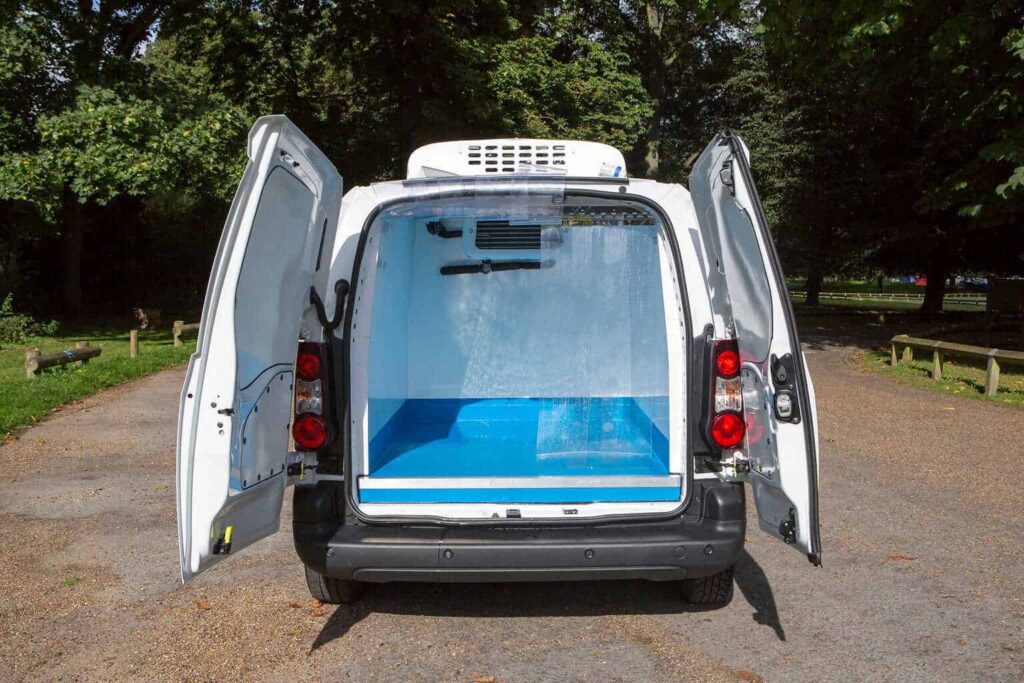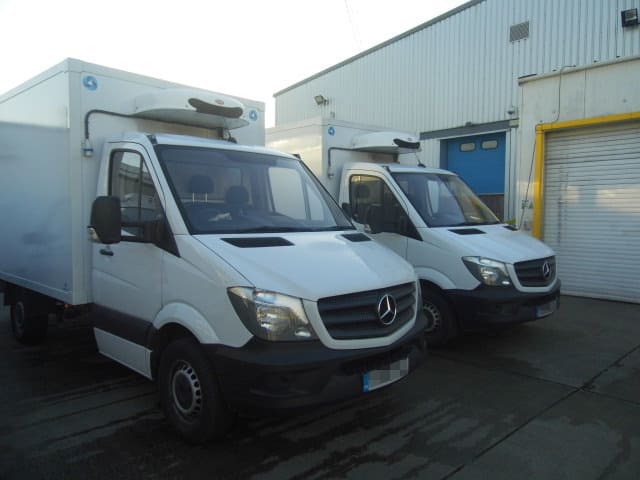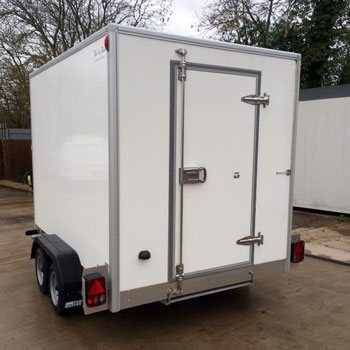Cold chain logistics is an integral component of modern supply chains, particularly in sectors where temperature-sensitive products are prevalent. The need to maintain specific temperature conditions from the point of production to the final consumer ensures that products such as food, pharmaceuticals, and certain chemicals remain safe and effective.
For companies operating within these industries, managing cold chain logistics efficiently and reliably is not just a matter of regulatory compliance; it is a competitive necessity.
Here, we explore the critical role of cold chain logistics in the modern world, the challenges faced by companies of various sizes, and the importance of choosing the right partners, particularly specialist refrigerated van hire and leasing services like FridgeXpress.
The Role of Cold Chain Logistics in the Modern World
Cold chain logistics has become increasingly vital as consumer demands for fresh produce, ready-to-eat meals, and temperature-sensitive pharmaceuticals have risen. In a globalised market, products are often sourced from various parts of the world, requiring a seamless and efficient cold chain to ensure that they reach the consumer in optimal condition.
In the food industry, the cold chain ensures that perishable items, such as dairy products, meat, and fresh fruits and vegetables, maintain their quality and safety throughout the distribution process.
Similarly, in the pharmaceutical sector, cold chain logistics is essential for transporting vaccines, biologics, and other temperature-sensitive medicines that could lose efficacy if exposed to temperature fluctuations.
Moreover, the importance of cold chain logistics extends beyond just preserving the quality of products; it also plays a significant role in reducing waste.
For example, improper handling or inadequate cold chain infrastructure can lead to significant food spoilage, contributing to food insecurity and financial losses for businesses. Thus, effective cold chain management not only safeguards product integrity but also supports sustainability efforts.
Challenges Faced by Companies in a Competitive Environment
Operating within a competitive environment, companies—regardless of their size—face numerous challenges in managing cold chain logistics. These challenges can be broadly categorised into operational, regulatory, and financial aspects.
- Large Companies: Large enterprises typically have the resources to invest in advanced cold chain infrastructure. However, they often face challenges related to the scale of their operations. Managing a vast fleet of refrigerated vehicles, ensuring consistent temperature control across multiple distribution centres, and maintaining compliance with varying international regulations are significant hurdles. Additionally, large companies are under constant pressure to optimise costs while maintaining high standards of service, which requires a delicate balance between efficiency and investment in cutting-edge technology.
- Medium-Sized Companies: Medium-sized businesses, while more agile than larger corporations, often struggle with resource constraints. They may not have the same level of access to sophisticated cold chain technologies or extensive logistics networks. For these companies, managing cold chain logistics is a matter of optimising available resources while trying to scale their operations to compete with larger players. The need to stay competitive can push these companies to seek out strategic partnerships or invest in third-party logistics providers, which may increase operational complexity.
- Small Companies: Small enterprises, particularly start-ups or local businesses, face the most significant challenges in cold chain logistics. Limited budgets, lack of infrastructure, and the high cost of maintaining a fleet of refrigerated vehicles make it difficult for these companies to compete. Often, small businesses have to rely on renting or leasing refrigerated vehicles, which, while cost-effective, require careful planning and management to ensure reliability and efficiency. These companies must also navigate the complexities of regulatory compliance, which can be particularly challenging without in-house expertise.
Industry-Specific Challenges in Cold Chain Logistics
Different industries face unique challenges when it comes to managing cold chain logistics. Understanding these challenges is crucial for companies seeking to enhance their competitive advantage.
Food and Beverage Industry:
The food and beverage sector is perhaps the most reliant on cold chain logistics. The main challenge in this industry is maintaining the freshness and safety of perishable goods.
This requires not only precise temperature control but also speed in distribution to minimise the time products spend in transit. Any disruption in the cold chain, such as a vehicle breakdown or power outage, can lead to significant product loss and safety risks, which in turn can damage a company’s reputation.
Pharmaceutical Industry:
The pharmaceutical sector faces stringent regulatory requirements for cold chain logistics. Medicines, vaccines, and biologics often have narrow temperature ranges within which they must be stored and transported.
A single temperature excursion can render these products ineffective or even harmful. Moreover, the global nature of pharmaceutical distribution means that companies must comply with varying regulations across different countries, adding layers of complexity to cold chain management.
Chemical Industry
In the chemical industry, certain products require strict temperature control to prevent hazardous reactions.
The challenge here is not only to maintain the required temperatures but also to ensure the safety of the transportation process. Specialised vehicles and containers are often needed, and any failure in the cold chain can have serious environmental and safety consequences.
Cold Chain Logistics for Event and Festival Organisers
Event and festival organisers face unique challenges when it comes to cold chain logistics, particularly when catering to large crowds or managing multiple events in various locations.
Whether it’s a music festival, food market, or a cultural event, maintaining the freshness and safety of food and beverages is crucial to ensuring a successful and memorable experience for attendees.
The Importance of Cold Chain Logistics in Event Management
Events and festivals often involve the sale and distribution of perishable goods, ranging from gourmet street food to artisanal ice creams and craft beverages.
These products require stringent temperature control to maintain their quality and safety throughout the event. Inadequate cold chain management can lead to food spoilage, potential health risks, and a tarnished reputation for the event organisers.
In addition, events often take place in remote or outdoor locations, where access to traditional refrigeration facilities may be limited. This necessitates the use of mobile cold storage solutions, such as refrigerated vans or trailers, which can be positioned on-site to ensure that perishable goods are kept at the correct temperatures.
For event organisers, the ability to provide reliable cold chain logistics is not just a logistical requirement; it is a key factor in delivering a high-quality event that meets the expectations of attendees and vendors alike.
Cold Chain Logistics for Companies Delivering Across Europe
For companies that deliver temperature-sensitive products across Europe, cold chain logistics becomes significantly more complex. The need to maintain consistent temperatures over long distances, navigate varying regulatory requirements, and manage cross-border logistics requires a highly coordinated approach.
Ensuring that products arrive in optimal condition is not only critical for customer satisfaction but also for meeting stringent industry standards.
The Challenges of European Cold Chain Logistics
Delivering perishable goods across Europe presents several challenges:
- Temperature Consistency: Maintaining the required temperature throughout the journey is essential to preserving product quality. This is particularly challenging when dealing with long distances and multiple border crossings, where delays or disruptions can occur.
- Regulatory Compliance: Each European country has its regulations regarding the transport of temperature-sensitive goods. Companies must ensure compliance with these regulations, which can vary significantly between countries. Failure to do so can result in fines, delays, or even the confiscation of goods.
- Cross-Border Logistics: Managing logistics across multiple countries involves dealing with different customs procedures, documentation requirements, and transport regulations. This adds a layer of complexity to cold chain logistics, particularly for companies that do not have a dedicated logistics team.
The Importance of Choosing the Right Partners
Given the complexities and challenges associated with cold chain logistics, choosing the right partners can be a decisive factor in a company’s success. Whether a company is large, medium, or small, partnering with a specialist service provider like FridgeXpress can offer several advantages that go beyond simple vehicle hire.
Access to Expertise: Cold chain logistics requires specialised knowledge, particularly when it comes to managing temperature-sensitive products.
FridgeXpress, with its extensive experience in the field, can provide valuable insights into best practices for cold chain management. This expertise is particularly beneficial for small and medium-sized businesses that may not have in-house logistics teams.
Wide Range of Vehicles: One of the key benefits of working with a specialist like FridgeXpress is the access to a diverse fleet of refrigerated vehicles. Whether a company needs a small van for local deliveries or a larger vehicle for long-haul transportation, FridgeXpress can provide the right solution.
This flexibility allows companies to choose vehicles that best meet their specific needs, optimising both cost and efficiency.
Maintenance and Servicing: Cold chain vehicles require regular maintenance to ensure they operate efficiently and reliably. When leasing vehicles from FridgeXpress, companies benefit from comprehensive maintenance and servicing packages.
This not only reduces the burden on the company’s resources but also minimises the risk of vehicle breakdowns, which can disrupt the cold chain and lead to product losses.
Scalability: In a competitive environment, companies often need to scale their operations up or down quickly in response to market demands. FridgeXpress offers flexible leasing options that allow businesses to adjust their fleet size as needed.
This scalability is particularly advantageous for seasonal businesses or companies experiencing rapid growth, as it enables them to manage their cold chain logistics without committing to long-term investments in vehicle ownership.
The Benefits of Working with FridgeXpress
FridgeXpress stands out as a partner in cold chain logistics for several reasons, making it an ideal choice for businesses seeking to enhance their competitive edge in the UK market.
Expertise that Counts
FridgeXpress understands that each business has unique needs when it comes to cold chain logistics. The company offers tailored solutions that take into account the specific requirements of different industries and businesses of varying sizes. This personalised approach ensures that companies get the most out of their partnership, whether they are leasing a single vehicle or an entire fleet.
Reduced Costs
For many businesses, particularly small and medium-sized enterprises, the cost of maintaining a fleet of refrigerated vehicles can be prohibitive. FridgeXpress offers cost-effective leasing options that include maintenance and servicing, helping businesses manage their cold chain logistics without the high upfront costs associated with vehicle ownership. This financial flexibility is crucial in a competitive environment where cost control can make a significant difference to a company’s bottom line.
Reliability Built-In
In cold chain logistics, reliability is paramount. FridgeXpress is known for its commitment to maintaining high standards of service, ensuring that its vehicles are always in optimal condition. This reliability translates into fewer disruptions in the cold chain, which in turn helps businesses maintain product quality and meet delivery deadlines.
Sustainable Solutions
As sustainability becomes increasingly important in the business world, FridgeXpress is committed to offering environmentally responsible solutions. The company’s fleet includes vehicles with low emissions, and it is continuously exploring new technologies to reduce the environmental impact of its operations. For businesses looking to enhance their green credentials, partnering with FridgeXpress can be a step in the right direction.
Contact FridgeXpress Today
Managing cold chain logistics in a competitive world is a complex and challenging task that requires careful planning, specialised knowledge, and the right partnerships. As industries continue to evolve and consumer demands grow, the importance of maintaining an efficient and reliable cold chain cannot be overstated.
For companies of all sizes, from large enterprises to small start-ups, the challenges of cold chain logistics are manifold, ranging from regulatory compliance to operational efficiency. However, by choosing the right partners, such as FridgeXpress, businesses can not only overcome these challenges but also gain a competitive advantage.
FridgeXpress offers a comprehensive range of services that go beyond simple vehicle hire, providing expertise, flexibility, and reliability that are essential for successful cold chain management. By partnering with a specialist provider, companies can focus on their core business activities, confident that their cold chain logistics are in capable hands.
In a world where competition is fierce and the margin for error is slim, the ability to manage cold chain logistics effectively can be a key differentiator. With the right approach and the right partners, businesses can ensure that they not only meet the demands of today’s market but also thrive in the face of tomorrow’s challenges.
Want to find out more? Contact our expert team today to begin a conversation.




